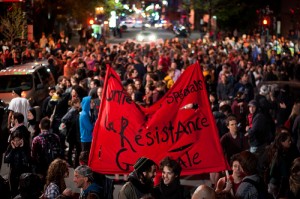Quebec protests are hurting McGill
Prospective students worry about disruptions
A 2012 Quebec student protest (Alexis Gravel/Flickr)
Share

Almost a year ago, I was a prospective student touring McGill University for the first time. I remember the excitement, the nerves and the shock of seeing more than 100 people protesting on campus. For the dozen or so students on my tour, it was our first impression of McGill and, to be honest, it was a bit of a deterrent.
I recall a parent on the tour asking how disruptive the protestors were for classes. It was a serious concern of his and many others. Of course, we were assured that it was not disruptive at all and that the protests had very little to do with McGill. That alleviated the concern in my mind, but I’m sure that it was not the case for others.
In the past few months, I’ve been receiving emails from friends back home in Vancouver who are currently in their graduating year of high school and are now attempting to navigate the confusion of choosing a university. While I’ve gotten the classic questions—“How are the professors?” and “What’s the nightlife like?”—the one theme that keeps coming up is Quebec’s student movement. My friends’ concerns include not only how protests affect classes, but whether they are violent or too intense. I have assured everyone asking these questions that the protests are not an issue; they stay out of McGill’s way, they are not violent and they do not affect the classrooms.
Despite my assurances, many still expressed doubt and declared it would still be a consideration in their decisions. These kinds of questions show a consistent perspective that protests are a major deterrent and one that seriously influences students’ choices of schools.
In the Times Higher Education World Reputation Rankings of 2013, McGill has been ranked in 31st place—a serious drop from last year’s 25th place. These rankings are subjective, but they seem to accurately show the international opinion of a university’s reputation. Reputation is a serious factor—not only for decisions of attendance, but also job prospects for McGill graduates. If McGill’s reputation continues to fall, the consequences could be serious. Such a fall calls into question what, precisely, led to this slip in rankings and what we can do to help fix it and repair McGill’s reputation.
The continued concerns of potential students may be indicative of this issue. Universities, in part, gain their reputation from the amount of demand from students. If students no longer choose McGill, and would rather attend a university of lower ranking to avoid the complications of protests, it would be surprising for McGill not to experience a fall in rankings. Students are key for a university to prosper and when they choose other institutions it becomes an issue the school must address.
Certainly, the protests have a cause. They are not senseless. The unfortunate reality, however, is that these protests are hindering rather than helping McGill’s situation in the long run. A fall in rankings because of protests can lead to lower interest in enrollment at McGill. This decrease will lead to an even larger fall in rankings, and even less money and resources for McGill and other universities—the precise issue many are currently protesting.
It becomes a vicious cycle that should be stopped sooner rather than later. The protests do combat real issues, but in order to help fix the situation, there needs to be a more cooperative way to help repair it. The protests are simply causing more damage than they’re worth.
Victoria Dillman is in year one of English Literature. A version of this appeared in the McGill Tribune.